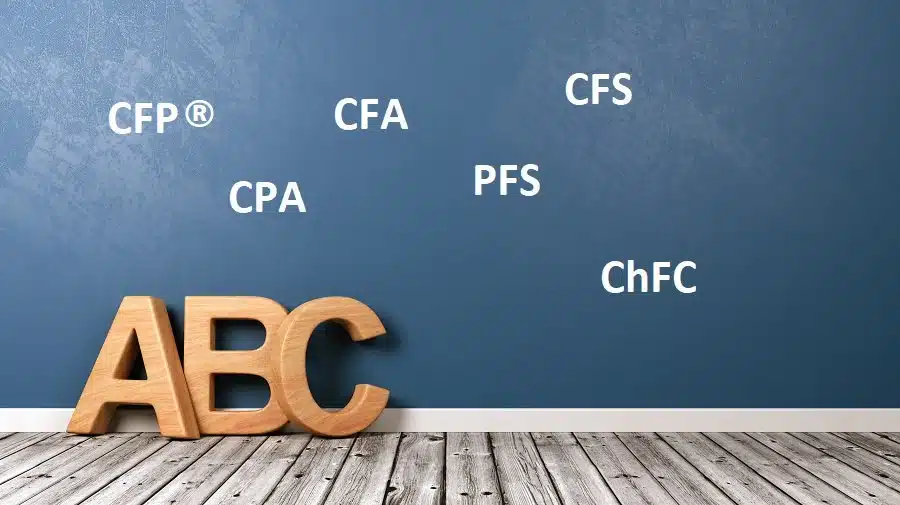Have you ever noticed how many people call themselves a financial advisor? Anyone can use the title financial advisor, but there’s something you should know.
The title “Financial Advisor” is unregulated. Yes, you heard that right. There is no law that governs the use of such a professional title. Shockingly, that means just about anyone, and I mean anyone, can dress the part, talk the talk, and use the title to mislead trusting and unsuspecting investors.
The good news is despite the title not meaning anything, the professional designations a financial advisor holds – that trail of letters that follow a financial advisor’s name, do.
When looking for an advisor, start by focusing on your specific needs first. Do you need help with investments? Or maybe some advice on how much life insurance you need? Perhaps you received a notice form the IRS about some overdue taxes? Whatever the case may be, selecting the right type of financial advisor always starts with you and your circumstances.
Once you have an idea of where you need help, you can then begin. Here’s how to understand the different types of professionals with the title, “financial advisor” and what their designations mean for you.
The Financial Designations to Look For
At last count, there were over 100 different types of credentials acknowledged by the Financial Industry Regulatory Authority (FINRA). That’s a lot of letters to sort through if you don’t know what to look for. And not all letters carry equal weight when it comes to qualifications. Notably, some designations require numerous hours and/or credits of formal education, multiple exams, years of experience, and continued education. Some do not. Understanding which designations signal elevated expertise is powerful knowledge when searching for a financial advisor.
Here is a short list of several respected financial designations that are worth looking for in your financial advisor:
•Certified Financial Planner® (CFP®)
Areas of expertise: Creating comprehensive financial plans and helping you manage just about every aspect of your financial life. Their education and training provide them with the broadest range of knowledge.
Requirements: Moreover, a CERTIFIED FINANCIAL PLANNER is required to pass the CFP exam, a 6-hour exam that roughly a third of people who sit for won’t pass. The course of study to become a CFP® covers all areas of the financial planning industry, and there is a 3-year experience requirement in addition to earning a bachelor’s degree. That means that a CFP® hopeful needs to spend three years working for a financial planning firm before they can earn the designation even if they already have a bachelor’s degree and have passed the exam.
Matters they can help with: Financial planning, estate planning, cash flow management, debt management, education planning, and investing.
•Chartered Financial Analyst (CFA)
Areas of expertise: Specializing in investment portfolio construction and management. CFA’s are considered the elite in the investment management world because of their in-depth knowledge and training which best equips them to understand how investments work and how to structure client portfolios.
Requirements: What’s more, the CFA designation is arguably the most difficult financial designation to earn. This designation requires three separate exams that are taken a year apart. Only 43% of test-takers pass round one of the exams, and only around 12% of the people who sit for the CFA exam will pass all three levels…12%!
Matters they can help with: Investment selection, investment management, portfolio construction, portfolio management, and market analysis.
•Certified Public Accountant (CPA)
Areas of expertise: This one probably sounds familiar. Financial advisors with the CPA designation are your tax people. They deal less with financial planning, but they are excellent resources for tax planning and accounting that usually accompanies a comprehensive financial plan.
Requirements: This designation also requires a rigorous exam and prerequisites are determined separately by each state. The New York State Board of Public Accountancy, for instance, requires that CPA candidates hold a bachelor’s degree or higher from a program that meets the 150 semester hour requirement, gain one year of full-time experience (or the part-time work equivalent) in the accounting field, get a CPA license after the successful completion of education and experience requirements, and obtain at least 40 contact hours of acceptable formal education in any of the recognized subject areas designated for CPE requirements to maintain a CPA license.
Matters they can help with: Tax planning and tax preparation.
•Personal Financial Specialist (PFS)
Areas of expertise: This designation is held by financial professionals who also hold the CPA designation. They are tax professionals with a special leaning toward comprehensive financial planning.
Requirements: The American Institute of Certified Public Accountants issues this designation to CPAs who also complete an additional 75 hours of personal financial planning education within 5 years preceding their PFS application. It also requires 60 hours of continuing education requirements every three years.
Matters they can help with: Essentially, this is the designation that CPAs earn so that they can demonstrate their expertise in all areas of financial management, not just tax and accounting.
•Certified Fund Specialist (CFS)
Areas of expertise: This is a designation that demonstrates expertise in mutual funds specifically.
Requirements: A bachelor’s degree OR 2,000 hours of financial service experience. To earn this designation, an individual must complete a self-study program, take three online exams, and complete 30 hours of continuing education credits every two years.
Matters they can help with: Selecting and investing in mutual funds.
•Chartered Financial Consultant (ChFC)
Areas of expertise: Like the CFP® designation, this designation means the professional has knowledge in financial planning.
Requirements: The primary difference between the ChFC and CFP® designations is that the ChFC requires fewer prerequisites, needing just three years of full-time business experience within five years of receiving the designation and 27 semester credit hours (vs. a bachelor’s degree and three years of personal financial planning experience required for a CFP®).
Matters they can help with: Financial planning, retirement planning, estate planning, business planning, cash flow management, debt management, and investing.
Conclusion
Credentials are a good indication of how qualified someone is to offer you financial advice and services. However, understanding credentials won’t tell the whole story of the type of financial advisor you’re considering hiring.
A few more relevant pieces of information you can ask or research a prospective advisor are:
· Whether or not they are a fiduciary (registered with the SEC and required by law to protect your best interests)
· How they are compensated (because a commission-based income signals a conflict of interest)
· How much experience he or she has in finance, investing, and planning
· What type of clients they serve
You can never be too thorough when it comes to your personal finances. Have high expectations for your financial advisor. As you can tell, there are certain professionals who adhere to the highest standards of care and expertise. When you know what to look for, you can be confident in your resolve to hold out for the right type of financial advisor who can meet your needs.




